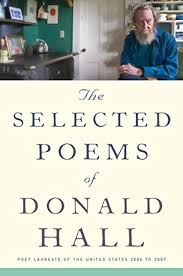
While reading The Selected Poems of Donald Hall, I jumped to the “Postscriptum,” where Hall offers up some thoughts on poetry writing — and especially on poetry sharing with someone who could give competent feedback. In Hall’s lucky case, he was married to that person, fellow poet Jane Kenyon, until she died of leukemia at the ridiculously young age of 47. What follows are selected bits from Hall’s P.S.:
- “Reading my things aloud a thousand times, I have become aware of language that works and language that has dead spots.”
- “Most of my life, I have worked on poems each morning, fiddling with everything. I have crossed out a word and substituted another; the next day I have often returned to the first word, or found yet another. Or I have broken a line at a new place. Always when I finished a poem, I showed it to friends who told me if it was terrible, or at least suggested improvements. I did the same for them.”
- After we married, Jane [Kenyon] and I worked together over each other’s poems. We did not look at early drafts — it’s a bad habit; wait until the poem solidifies — but when the poems felt done, each of us used the other as first reader. One day I would say, ‘I left some stuff on your footstool,’ or Jane would tell me, ‘Perkins, there are some things on your desk.’ (‘Perkins’ was me.) If I repeated a word — a twist acquired from Yeats — Jane crossed it out. Whenever she used verbal auxiliaries I removed them, and ‘it was raining’ became ‘it rained.’ Jane kept her lines clear of dead metaphor, knowing my crankiness on the subject. She exulted when she found one in my drafts. ‘Perkins! Here’s a dead metaphor!’
- “Neither of us did everything the other said. We helped each other vastly. She save me from a thousand gaffes, cut my wordiness and straightened out my syntax. She seldom told me anything was good. Sometimes she’d say, ‘This is almost done,’ or ‘You’ve brought this a long way, Perkins.’ I asked, ‘But is it any good?’ I pined for her praise. It was essential that we never go easy on each other.
- “People have long assumed that poets flourish when they are young, but for most poets their best work comes in middle life. Wallace Stevens said, ‘Some of one’s early things give one the creeps.’ A friend insists that no one should publish a poem written after eighty. I hope I wrote good things, young and old, but my best work came in my early sixties.”